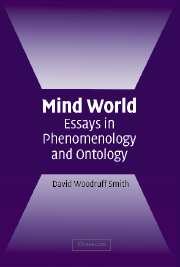Book contents
- Frontmatter
- Contents
- Prolegomena: The Terroir of Consciousness and the World
- Origins of the Essays
- Overview: A Story Line
- The Picture
- 1 Three Facets of Consciousness
- 2 The Cogito circa a.d. 2000
- 3 Return to Consciousness
- 4 Consciousness in Action
- 5 Background Ideas
- 6 Intentionality Naturalized?
- 7 Consciousness and Actuality
- 8 Basic Categories
- Coda: The Beetle in the Box
- Appendix: Background Conceptions of Ontology, Phenomenology, Philosophy of Mind, and Historical Philosophy
- Index
- References
4 - Consciousness in Action
Published online by Cambridge University Press: 05 June 2012
- Frontmatter
- Contents
- Prolegomena: The Terroir of Consciousness and the World
- Origins of the Essays
- Overview: A Story Line
- The Picture
- 1 Three Facets of Consciousness
- 2 The Cogito circa a.d. 2000
- 3 Return to Consciousness
- 4 Consciousness in Action
- 5 Background Ideas
- 6 Intentionality Naturalized?
- 7 Consciousness and Actuality
- 8 Basic Categories
- Coda: The Beetle in the Box
- Appendix: Background Conceptions of Ontology, Phenomenology, Philosophy of Mind, and Historical Philosophy
- Index
- References
Summary
Abstract. A phenomenology of action is outlined, analyzing the structure of volition, kinesthesis, and perception in the experience of action. These three forms of intentionality are integrated in a typical case of conscious volitional action. In their integration we find the structure of our everyday experience of embodiment in action. The intentionality of action is contrasted with that of thought and perception in regard to the role of the body, and the relations between an action, the experience of acting, and the context of the action are specified.
Segue. In “The Cogito circa a.d. 2000” we argued that the experience of consciousness includes an inner awareness of the act of consciousness (sans dualism and sans incorrigibility). In “Return to Consciousness” we analyzed the form of inner awareness in detail. Phenomenological analysis begins with our awareness of our own experience as lived. Often this phenomenological perspective, grounded in inner awareness, is assumed to lead to an isolation of mind from body. However, a careful phenomenology of action shows that this structure of consciousness already places consciousness in intimate relations to the “lived” body, so the “inner” is already tied to the “outer,” the “subjective” to the “objective.” Thus, consciousness is already embodied as we experience it in everyday action. Inversely, the body is itself experienced in conscious action. That is, consciousness is itself experienced as part of nature, beginning with one's own body.
- Type
- Chapter
- Information
- Mind WorldEssays in Phenomenology and Ontology, pp. 122 - 146Publisher: Cambridge University PressPrint publication year: 2004



